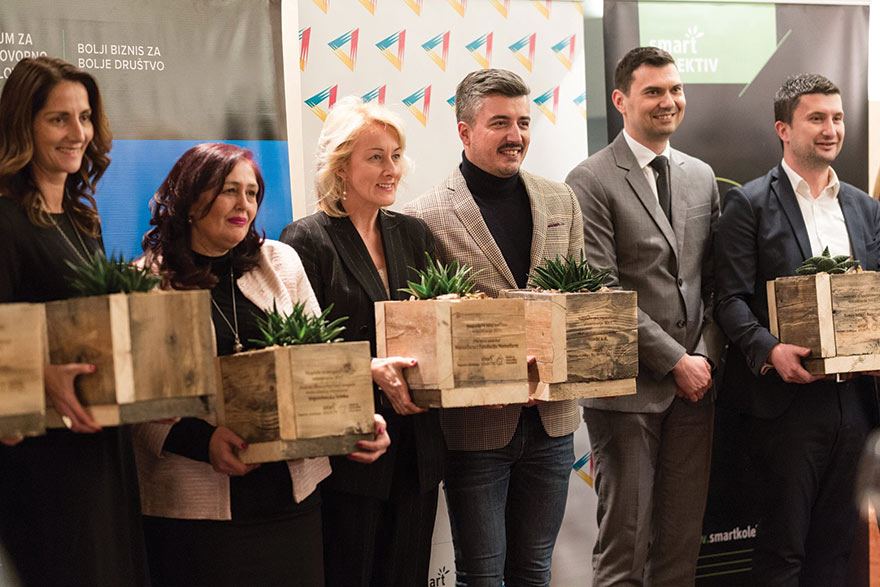We are witnessing changes to values, behaviour and priorities in all aspects of life, as well as in interactions between businesses and the society and communities in which they operate.
Without a shadow of a doubt, and without competition, the Coronavirus pandemic marked all aspects of life in 2020, including the domain of CSR activities. “We are aware of how negatively it has impacted on society and the economy, especially certain segments of the economy, the health system and individuals,” says Neven Marinović, Co-founder and Director of Smart Kolektiv and Executive Director of the Responsible Business Forum Serbia.
Companies first had to focus massively on the safety and health of employees, both physical and mental, which is certainly a positive trend, and many of these experiences and practices will continue being applied even after the epidemic ends, notes our interlocutor. On the other hand, as he explains, companies have – like society as a whole – reconsidered their business practices, but also their priorities in doing business. We can state unreservedly that companies will pay much more attention to topics related to sustainable business in the future, because it is now much clearer to everyone how important it is to preserve ecosystems that are already significantly damaged, to turn and direct the majority of business towards the local level, which includes local suppliers and partners, but also to support society as a whole and the support systems that are essential to us, such as healthcare and social care.
Alongside some global initiatives – such as the roadmap to achieve the UN Sustainable Development Goals, the manifesto of the World Economic Forum in Davos that calls for more responsible capitalism, and the new measures of the European Commission aimed at combating climate change – we can definitely expect these topics to be in the spotlight even more.

When it comes to the tangible engagements of companies in the period ahead, future investments in socially responsible projects will be influenced greatly by the epidemiological situation – by its seriousness and duration. Most companies that don’t have endangered operations aren’t planning to abandon their activities to date related to engagements in the community, emphasizing that such engagements should be strengthened during times of crisis.
What do you consider as the key characteristics of company donations directed towards responding to the pandemic?
According to the annual questionnaire Better Business for a Better Society, which was conducted again this year by the Responsible Business Forum, under the scope of the Project Framework for giving implemented by the Coalition for giving with the support of USAID, 95% of surveyed companies were involved in supporting the community during the crisis, with the aim of preventing the negative consequences of the pandemic. This support came mostly in the form of monetary donations, but we could also see a significant share of donations in products. Companies also provided support in the form of the provision of pro bono services, through the launching of special projects to support small and medium-sized enterprises and with campaigns calling for responsible behaviour.
The Responsible Business Forum and Smart Kolektiv have been awarding the Volunteering Award since 2011. An invitation was announced on the eve of 5th December, International Volunteer Day, while the awards will be presented in March 2021.
The surveyed companies donated an average of around seven million dinars to mitigate the negative effects of the pandemic, based on data collected until the end of June this year, while the largest amount of an individual donation recorded was 54.4 million dinars. Almost half of the recorded amount of donations was intended for direct support to the health system (RHIF and health institutions), while the other half was directed towards the support of local governments and local and national organisations dealing with humanitarian work, as well as institutions of social protection.
Organisations that deal with the topic of CSR and companies have been advocating for a long time for the introduction of stimulating legal measures, such as the abolition of VAT on food donations. This partly occurred during the pandemic. Is there space for this kind of change to become a permanent solution?
It was made possible during the state of emergency to donate goods/equipment without paying VAT, for those donations that were sent to healthcare institutions. Most of the companies that we had an opportunity to talk with assessed the implementation of this mechanism as being good. However, it seems that the wider coverage of donations with this measure was lacking, bearing in mind the current needs that have emerged in the wider community and the increased need, among other things, for food donations.
When it comes to food donations, this is a long-term issue that relates mostly to support for the most endangered sections of society, but it also has a great impact on environmental issues and the efficient use of limited natural resources. It is a known statistic that a third of food is destroyed globally, producing up to eight per cent of all greenhouse gases. The amount of food destroyed in Serbia is measured in the billions of dinars and has a value ten times that of food that is donated, and one of the reasons for that is the lack of a stimulating fiscal framework.

The situation at present is such that it pays off more for businesspeople to wait for the expiry date of food to pass and to send it for destruction than it does to donate food prior to the date of expiry. This certainly isn’t the case in the countries of the European Union, which resolved this issue by adopting the Guidelines for food donations and currently 20 of the 27 EU member states do not charge VAT on food donated before its date of expiry.
Analysis conducted by the the Responsible Business Forum, on behalf of the Coalition for giving with the support from USAID, shows that the social benefits of abolishing VAT would greatly exceed the potential social costs. The current value of food donated on the Serbian market is estimated at 525.6 million dinars, but with the measure of abolishing VAT this total would increase by almost a third, i.e. to an amount close to 700 million dinars. If we view this increase through the monetary value of one meal, it could mean an additional 1.2 million meals.
We have also presented this proposal to decision makers, and we are hopeful that there will be room to continue the dialogue and for this proposal to be adopted in the near future.
You also advocate for the abolition of the taxable amount of scholarships for pupils and students, and in the previous period you had your first discussions on this topic with the Ministry of Finance and the Tax Administration.
The minimum non-taxable amount for scholarships that are awarded to pupils and students was increased from 11,741 to 30,000 dinars with the adoption of amendments to the Law on Personal Income Tax in October 2019, and it was subsequently adjusted further, in February 2020, and currently stands at 30,570 dinars.
This is one of the significant achievements that came as a result of joint work with the Council for Philanthropy, which was established by the Prime Minister of the Republic of Serbia within the previous mandate, and included – in addition to the aforementioned ministries – organisations gathered in the Coalition for giving comprising the Ana and Vlade Divac Foundation, Trag Foundation, Smart Kolektiv, Catalyst Balkans, the Responsible Business Forum, the Serbian Philanthropic Forum and the Chamber of Commerce & Industry of Serbia, as initiators of this initiative.
The amount of food destroyed in Serbia is measured in the billions of dinars and has a value ten times that of food that is donated, and one of the reasons for that is the lack of a stimulating fiscal framework
Which measures are essential when it comes to motivating more companies and wealthy individuals to help society?
The transparency of information and strengthening of mutual trust are prerequisites for establishing lasting partnership relations among all stakeholders in society. For example, when it comes to companies, under amendments to the Law on Accounting, which came into force on 1st January 2020, large companies with over 500 employees are required to report on sustainability, which represents a significant indicator of the quality of operations and, thus, the building of trust and the impact a company has on society. In this sense, the impact that companies have on society will also be an increasingly important measure for the financing of activities, but also for the market preferences of consumers.
What seems to me to be an essential measure is to work on the systematic recognising and evaluating of good practises, the more strategic positioning of responsible and sustainable operations in our country’s development agenda and the building of a general consensus regarding priorities in which to invest. It is with this objective in mind that the Responsible Business Forum has launched a consultation process with the business community that has the idea of advocating for the initiation and adoption of a new sustainable business agenda. When it comes to sustainable development, the priorities for the business sector – according to research into the attitudes of the business community – show that we have a number of topics that need to be worked on systemically. When it comes to people, these are: the hiring of young people, training and educational courses for professional occupations, working inclusivity of persons with disabilities, health and safety at work, as well as reducing inequality and poverty. When it comes to environmental protection, the challenges and opportunities for advancement relate to the management of waste and chemicals, energy efficiency, efficiency of the use of natural resources in production and consumption, as well as the quality and availability of water.
This is a time when many people worldwide have volunteered to help their compatriots and other people to overcome the pandemic. Our Law on Volunteering has been criticised on multiple occasions due to its inappropriate solutions. How much does this result in volunteering, as a form of CSR, suffering?
The whole society suffers due to an inadequate legal framework for volunteering. Unfortunately, volunteering through the legal framework is not valued and recognised as a universal value that should be nurtured and encouraged, rather the emphasis is placed on the prevention of abuse. Corporate volunteering is based on a company’s existing relationship with its employees, so this relationship already exists and is further regulated by internal policies that define when and how employees can dedicate time to a social goal, with the company’s support. However, we are also seeing the emergence of new ways of engaging, such as expert volunteering and remote online volunteering, which remain unclear in the legal sense. On the other hand, a clear distinction needs to be made between volunteering and internships, which have been rendered almost equal in some professions. There are numerous reasons why organisations have pointed out the need for a more stimulating framework for years. However, progress has also been made in that domain this year.
After almost a decade of implementing the Law on Volunteering, the Ministry of Labour, Employment, Veterans and Social Affairs has formed a Working Group, and we have taken on active participation in its work. An ex post analysis of the effects of the implementing of this law, which was conducted within the scope of the mandate of this working group – comprising representatives of state institutions, civil society organisations and trade unions – showed that the law needs to be amended, so we now expect the forming of a new working group that will work in detail on ex ante analysis and the proposal for amendments to the law on volunteering.